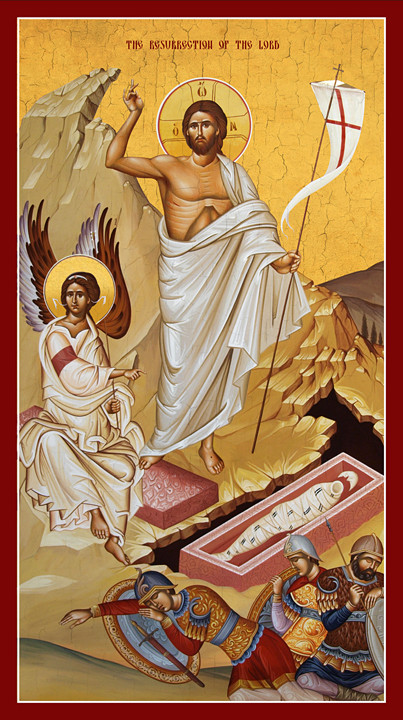The Day of Pentecost
Then Peter stood up with the Eleven,
raised his voice and addressed the crowd: “Fellow Jews and all of you who live
in Jerusalem, let me explain this to you; listen carefully to what I say. These
men are not drunk, as you suppose. It’s only nine in the morning! No, this is
what was spoken by the prophet Joel: In the last days, God says, I will pour
out my Spirit on all people. Your sons and daughters will prophesy, your young
men will see visions, your old men will dream dreams” (Acts 2:14-17).
Pentecost is the day that Christians
celebrate the outpouring of the Holy Spirit on the Apostles in Jerusalem,
manifested by the descent of tongues of fire from heaven, and the speaking of
the Apostles in the many languages of the peoples assembled there. By this
event, and Peter’s subsequent preaching, we are taught how to understand God’s
word. Pentecost also reveals to us the nature and work of God, the Holy Spirit.
Most importantly, however, Pentecost shows that God’s saving grace is not
confined to one ethnic group of people, but that the Gospel of Christ crucified
as the sacrifice for sin and risen from the dead for man’s redemption belongs
to the whole world. Moreover, the outpouring of the Holy Spirit is something
that continues to happen from that day to this, and until Our Lord Jesus
returns to judge the living and the dead, through His word preached, and given through
water, bread and wine.
First, the opening of Peter’s Pentecost
sermon teaches us how to read the Bible. Peter connects the Old Testament
scriptures, specifically the words of the prophet Joel that he quotes, to the
events unfolding around them. Peter then goes on to use the power and authority
given him by the Holy Spirit by preaching to the people repentance and
forgiveness of sins in the crucified and risen Jesus. The New Testament is
basically a commentary on, or more precisely, an exposition of the Old
Testament. When we read the Bible, or listen to preaching, we are to recognize
that the Old Testament always points to Christ and is to be explained in the
light of the New Testament, and not the other way around.[1]
Consequently, the New Testament
scriptures expose in greater detail what the Old Testament scriptures reveal
about the divine nature and work of God, and His Holy Spirit, by the events of
Pentecost. The Holy Spirit is the third person of the triune, or “three-person”
God, and not just an impersonal force, power, or energy. Jesus tells us that
the Holy Spirit has His own work, that of convicting the world of sin, and
leading the disciples into all truth;[2]
He tells us that the Spirit proceeds from both Him and God the Father; Also, as
recorded by Luke in the book of Acts, the Holy Spirit is called God, and speaks
to and directs the Apostles Himself.[3]
The Holy Spirit operates in perfect harmony with God the Father, and God the
Son, to work the forgiveness of sins, life, and salvation in man through the
word of God. An inanimate object, or an impersonal being, cannot speak and do
things as Jesus tells us the Holy Spirit speaks and does; The outpouring of the
Spirit on the Apostles at Pentecost, and their preaching to the people shows us
that the Holy Spirit is God, and demonstrates His unity with the other divine
members of the God-head.
Finally, this outpouring of the divine
Holy Spirit is not confined to just the Apostles at Pentecost, but it is
continual. The supernatural speaking in tongues by the Apostles is the sign
that accompanies the power they received by the Holy Spirit, not the main gift,
and not something Christians should expect will always accompany the Spirit’s
working. The purpose of this miracle was to show that foreigners, i.e.
non-Jews, could hear God’s word, and the Holy Spirit could use that word as His
tool to create faith in them.[4]
The coming of the Spirit is not a one-time occurrence but something that
happens continually when God’s word is preached and His Sacraments, namely Holy
Baptism, through which God gives the gift of the Holy Spirit,[5]
as Peter preaches, are properly administered. The miracle of Pentecost shows all
people that God does not want anyone to perish, but instead wants everyone to
come to repentance.[6]
Pentecost is not just some crazy miracle
story invented to spice up the narrative of Christianity, or to give legitimacy
to the Apostles by endowing them with supernatural tongue-speaking powers. Even
though videos of people rolling around on the floor “in the spirit” babbling
nonsensical gibberish may provide endless entertainment for viewers of YouTube,
Pentecost is about something far more important than the miracle of speaking in
tongues God performed that day. The events of Pentecost give us an important
instruction as to how we must understand God’s word. It shows us the nature and
work of the Holy Spirit. Most of all, Pentecost show us that God’s forgiveness
and eternal life in Jesus, won by his atoning sacrifice on the cross, is for
all people, and is given as a gift by the working of the Holy Spirit. ###


